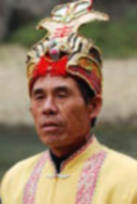Xie Qingliang – Inheritor of Liu Sanjie’s Ballads
By staff reporter JIAO FENG
Xie Qingliang lives in Dongping Village, Qingyuan Town, Yizhou City of Guangxi Zhuang Autonomous Region. In 2012, he was included in China’s National Intangible Cultural Heritage Inheritor List as a champion of folk singing. Now in his 60s, Xie recalls his love of singing folk songs that stems from his childhood. Over the decades, he has garnered a bunch of honors as a folk singer. In 1989, Xie won a local folk song competition, thus earning the title of local vocal king, and in 1997, he was crowned the “Guangxi Melody King” for his excellent performance at a provincial folk song challenge competition.
Guangxi Zhuang Autonomous Region is one of the five ethnic minority autonomous regions in China. Located in northern Guangxi, Yizhou City is home to different ethnicities, the majority Zhuang group and hometown of the Zhuang “Melody Queen” Liu Sanjie. A renowned figure in Zhuang culture, Liu Sanjie and her tales and folk songs are widely recounted. Locals believe that gexu– a Zhuang minority open folk song contest– has recently been revived thanks to Liu Sanjie’s popularity. Every year on the third day of the third lunar month, festivities are held across Guangxi to celebrate the gexu tradition and the memory of Liu Sanjie. And Yizhou City is regarded as the most representative region of Liu Sanjie’s folk song art.
Since winning the title of “Guangxi Melody King” in 1997, Xie Qingliang’s fame has spread far and wide. But what sets Xie apart from other performers of the same art is not necessarily his impressive vocal range or captivating performances, but rather his quick wit and humor. Xie’s talent lies in his ability to compose rhythms and words on the spot. He even greeted China Today’s journalists with an improvised welcome song when they visited him at his home.
 |
|
Xie Qingliang, a modern performer of Liu Sanjie’s ballads. |
Growing up with Folk Songs
Folk singing is a time-honored tradition in Guangxi and has many arenas, from the farmlands to weddings and funerals. Folk songs also play a predominant role in various festivals. The widespread folk song phenomenon has accorded Guangxi the reputation as “a sea of songs.” Moreover, local people enjoy antiphonal singing, where one starts, and others follow. If after several rounds of interactive singing, no one can follow a singer with a melody, then that singer wins the singing crown.
The environment in which Xie Qingliang grew up was equally permeated with singing. From dawn until dusk, in fields and by the riverside, folk songs were a central part of his fellow villagers’ daily lives. Xie recalls that since his village had no electricity when he was growing up, singing folk songs was the only form of entertainment. “Folk song is our regional treasure. Although there are seven or eight types of specific rhythms, the lyrics can be diverse because they are all improvised,” said Xie proudly.
Xie’s love for folk songs grew gradually. As a youngster, he would often try to copy the songs he had heard while herding sheep or collecting firewood. But it would be a few years before he could master the art of improvising lyrics.
Xie explained that there is a dazzling variety of folk songs in Zhuang culture: birth celebration songs, love songs, wedding songs, anniversary songs and comic songs, to name a few. Every village has at least one rhythm, a signature beat, distinct from others. Yizhou is home to the most rhythms in Guangxi. There are normally four lines in one folk song. During a musical dialogue in antiphonal style, the performances change depending on the opponents’ age and gender. All singers involved throw themselves whole-heartedly into the musical dialogue, and this intensity inspires their lyric creativity.
Xie Qingliang was so obsessed with the antiphonal singing that he pushed himself to watch all the various staged celebrations in the village. He had mastered antiphonal singing by the age of 17 but at that time, there were no folk singing teachers so Xie had no choice but to look to the singers he knew for guidance. When he listened to their antiphonal singing, Xie would imagine himself in their place and think about how he would sing the song. And he wouldn’t just listen; he would compose lyrics, too, saving a “draft” in his head every time and seeking advice if he got stuck. Seasoned folk performers encouraged him to feel the song, telling him, “If you love singing, you will voluntarily manage to understand and digest it. With time it will become second nature.” Xie Qingliang was often invited to join in antiphonal singing at festivals, celebrations or other local events if singers were short of partners. This was an opportunity Xie relished since it gave him good experience and taught him valuable lessons for the next performance. Xie’s hard work paid off. He established a strong foundation for folk song performance and his compositions got better and better.
